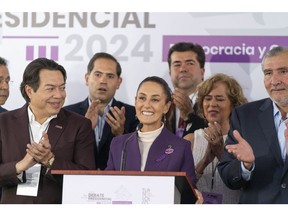Article content
(Bloomberg) — Mexico’s presidential candidates faced off for the third and final debate ahead of June 2 elections, in an exchange that seems unlikely to reduce the wide lead of the ruling party candidate Claudia Sheinbaum, despite the constant attacks against the government’s handling of insecurity.
With polls showing security as the main voter concern, the candidate for the main opposition parties Xochitl Galvez leaned into the persistence of homicides and violence to call for a vote against President Andres Manuel Lopez Obrador’s Morena party.
Article content
“Security has been a failure in this government,” she said. “The strategy of this government has been to hand the country over to organized crime.”
Sheinbaum, recognizing security remains a challenge, pointed to the number of homicides declining from 36,000 in the first year of Lopez Obrador’s administration to 29,000 last year and criticized the violent drug wars of previous administrations.
“President AMLO shifted policy from declaring war to building peace,” she said.
With over 170,000 homicides in 2018 through March, violence remains a hot-button issue for the candidates. Some analysts noted that Galvez could have leaned harder into the topic rather than attacking Sheinbaum with signs that called her a liar.
“Xochitl once against lost herself in the attacks and didn’t take advantage of the security crisis to question the government’s mistakes,” said Juan Carlos Villarreal, a political science professor at the Autonomous University of Mexico State.
Read More: Mexico’s Murders Top 170,000 as AMLO Directs Military Elsewhere
The candidates are competing to succeed AMLO, as the popular is known, who is barred by local rules from running for a second six-year term.
Article content
In the latest edition of the Bloomberg Poll Tracker, Sheinbaum had 57% of voter intention, a 27-point lead over Galvez, ahead of the debate on Sunday. Jorge Alvarez Maynez, the candidate running in a distant third place, has grown his voter intention to 13% and faced increasing calls to quit the race and throw his support behind Galvez. Before the debate, Maynez repeated he has no intention to do so.
Migration Challenge
The migration crisis at the US-Mexico border was another major topic of the debate. Galvez said that organized crime controls the flow of migrants in Mexico and criticized AMLO’s government for allowing the US to send migrants from other countries back to Mexico.
Sheinbaum, for her part, said she will seek to strengthen Mexico’s relationship with the US and Canada, the allies with which the country has a free trade agreement. Like Lopez Obrador, she called for the US to invest $20 billion to address the causes of migration instead of spending that money on weapons and wars.
Nearshoring Opportunity
The candidates also discussed nearshoring, the trend in which manufacturers are moving to Mexico to be closer to the US consumer market.
Article content
Maynez highlighted the growth in investment to states governed by his Movimiento Ciudadano party, Nuevo Leon — which shares part of the border with the US — and Jalisco.
Galvez said that while nearshoring can be a great opportunity for Mexico, the government hasn’t done enough to take advantage of the move, such as by investing in clean energy, water, infrastructure and security.
Sheinbaum responded by saying that AMLO’s administration has had the highest foreign direct investment of any government in Mexico.
The ruling party candidate managed to hold steady in every debate, highlighting a message of continuity with Lopez Obrador’s policies and noting she would maintain and improve his welfare programs and his largest infrastructure projects. Sheinbaum also reiterated that her government will seek to raise the minimum wage above inflation every year.
Her commanding lead over the last six months suggest it’s unlikely that the outcome of the final debate will significantly change voter preferences, Villarreal said.
“It’s not impossible, but it seems very unlikely,” he added.
Share this article in your social network

